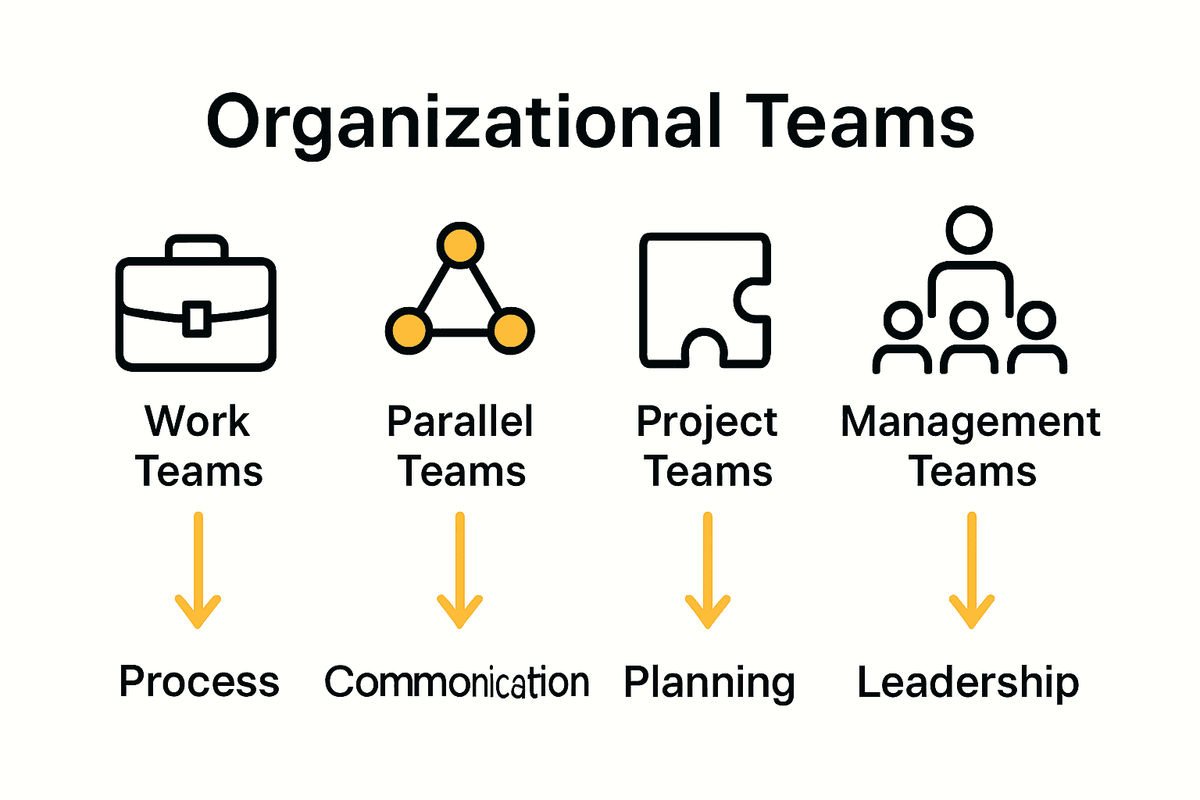Professional Bar Trivia SoftwareFor Venues & Events
- Players join via QR code — no app download
- 6 round types: Buzzer Race, Everyone Answers & more
- Rich media questions with images, video & audio
- Real-time scoring & leaderboards on the big screen
Why Team Challenges: Complete Guide for Managers
November 16, 2025

Over 80 percent of successful organizations rely on team challenges to boost teamwork and drive real results. Building a strong team is more than mixing personalities, it means creating experiences that turn coworkers into collaborators. These structured activities help teams solve problems, improve communication, and discover hidden strengths together. If you want to unlock smoother teamwork and elevate group performance, understanding the true purpose and design of team challenges can be your competitive advantage.
Table of Contents
- Defining Team Challenges And Their Purpose
- Types Of Team Challenges In Organizations
- Key Benefits For Teams And Managers
- How Team Challenges Foster Collaboration
- Common Pitfalls And How To Avoid Them
Key Takeaways
| Point | Details |
|---|---|
| Purpose of Team Challenges | They are designed to enhance team dynamics, communication, and collaborative skills, leading to improved organizational performance. |
| Tailored Approaches | Successful team challenges should be customized to specific team dynamics and organizational culture to effectively meet desired outcomes. |
| Benefits for Teams and Managers | Team challenges strengthen interpersonal relationships, improve communication, and can reveal hidden talents within the team, thus boosting overall morale. |
| Avoiding Pitfalls | Proactive planning is essential to mitigate common pitfalls like unclear roles and ineffective leadership, ensuring that challenges foster collaboration rather than tension. |
Defining Team Challenges and Their Purpose
Team challenges are strategic, purposeful activities designed to test, improve, and enhance team dynamics, communication, and collaborative skills within organizational settings. According to research from mmanc.org, these challenges serve critical functions beyond simple entertainment, focusing on developing stronger interpersonal relationships and organizational performance.
Team challenges fundamentally aim to address multiple organizational objectives. They help break down communication barriers, identify individual strengths and weaknesses, and create opportunities for team members to interact outside traditional work environments.
 rjwave.org highlights that such activities can significantly improve team communication and resolve underlying interpersonal conflicts that might impede workplace productivity.
rjwave.org highlights that such activities can significantly improve team communication and resolve underlying interpersonal conflicts that might impede workplace productivity.
The primary purposes of team challenges include:
- Enhancing group communication
- Identifying individual and collective strengths
- Developing problem-solving skills collaboratively
- Building trust and mutual understanding
- Creating shared experiences that strengthen team bonds
By strategically designing challenges that require collective effort, managers can transform potential workplace friction into opportunities for growth. When team members understand each other's capabilities and work styles through intentional, structured interactions, they become more effective and cohesive as a unit.
Team challenges are not one-size-fits-all propositions. The most successful approaches are tailored to specific team dynamics, organizational culture, and desired learning outcomes. Understanding Ways to Promote Teamwork can provide additional insights into creating meaningful team engagement strategies that go beyond superficial interactions.
Types of Team Challenges in Organizations
Organizations encounter diverse team challenge types that vary based on team structure and purpose. According to researchinventy.com, there are four primary team classifications, each presenting unique challenges: work teams, parallel teams, project teams, and management teams.
Each team type requires distinct approaches to challenge design and implementation. Work teams, which handle regular organizational operations, often need challenges focused on process improvement and daily collaboration. Parallel teams, typically composed of members from different departments, benefit from cross-functional challenges that enhance interdepartmental communication. Project teams require challenges that test strategic planning and time management skills, while management teams need challenges emphasizing leadership development and strategic decision-making.

ijern.com highlights that team challenges frequently address critical impediments to effective teamwork, such as:
- Resolving communication barriers
- Clarifying unclear organizational goals
- Improving collective decision-making processes
- Breaking down hierarchical silos
- Developing shared understanding
Strategic team challenges must be carefully tailored to address specific organizational needs and team dynamics. For managers seeking comprehensive insights into building stronger workplace teams, the 7 Best Team Building Games for Stronger Workplace Teams provides practical strategies for creating engaging and meaningful team experiences that drive performance and collaboration.
Key Benefits for Teams and Managers
Team challenges deliver transformative benefits that extend far beyond simple recreational activities. According to mmanc.org, these strategic interventions produce tangible organizational improvements, particularly in communication, performance, and collective goal achievement.
For team members, these challenges create profound personal and professional growth opportunities. Individual benefits include enhanced interpersonal skills, increased self-awareness, and improved problem-solving capabilities. Managers gain equally significant advantages, such as deeper insights into team dynamics, identification of leadership potential, and the ability to address underlying workplace tensions before they escalate.
Key benefits for teams and managers encompass:
- Strengthening interpersonal relationships
- Identifying hidden team talents
- Improving communication channels
- Reducing workplace conflicts
- Boosting overall team morale and engagement
rjwave.org emphasizes that defining clear goals during team challenges is crucial for maximizing these benefits. By strategically designing experiences that challenge and support team members simultaneously, organizations can create a more cohesive and dynamic workplace environment. For managers looking to dive deeper into fostering exceptional teamwork, the How to Foster Teamwork for Stronger Corporate Collaboration provides comprehensive strategies for building high-performing teams.
How Team Challenges Foster Collaboration
Team challenges serve as powerful catalysts for transforming workplace dynamics and building robust collaborative environments. arxiv.org research reveals that strategic group activities can significantly enhance team coordination, particularly crucial in modern work environments where traditional interaction patterns are constantly evolving.
At the core of collaboration, team challenges break down communication barriers by creating shared experiences that transcend individual roles and departmental boundaries. These intentionally designed interactions force team members to communicate, negotiate, and problem-solve together, developing interpersonal skills that extend far beyond the immediate challenge. By placing individuals in scenarios that require collective thinking, organizations can naturally cultivate a collaborative mindset.
Key mechanisms through which team challenges foster collaboration include:
- Establishing psychological safety
- Encouraging cross-functional communication
- Revealing individual strengths and complementary skills
- Creating mutual understanding
- Building trust through shared achievements
arxiv.org highlights the complex dynamics of team collaboration, noting that while internal team interactions might be strong, inter-team collaboration requires deliberate strategies. Managers can leverage team challenges as a nuanced approach to bridging these potential communication gaps. For those seeking more targeted strategies, the 7 Top Team Building Exercises for Better Workplace Collaboration offers practical insights into creating meaningful collaborative experiences.
Common Pitfalls and How to Avoid Them
Team challenges, while powerful, are not immune to potential missteps that can undermine their effectiveness. day-off.app highlights critical organizational challenges that can derail even the most well-intentioned team-building efforts, with unclear roles and ineffective leadership emerging as primary culprits.
The most common pitfalls in team challenges typically stem from poor planning, misaligned objectives, and inadequate preparation. Structural weaknesses can manifest in various ways: selecting inappropriate challenge types, failing to consider individual team member capabilities, or creating scenarios that inadvertently create more tension than collaboration. Managers must carefully design challenges that are inclusive, engaging, and aligned with specific team development goals.
Key pitfalls to watch for and strategies to mitigate them include:
- Avoiding challenges that feel forced or artificial
- Ensuring equal participation across all team members
- Preventing competitive dynamics that create workplace friction
- Matching challenge complexity to team skill levels
- Creating psychologically safe environments for participation
Proactive planning is the cornerstone of successful team challenges. By anticipating potential obstacles and designing thoughtful, inclusive experiences, managers can transform potential pitfalls into opportunities for growth. For those seeking deeper insights into navigating team dynamics, the Understanding the Managers Team Building Guide provides comprehensive strategies for creating meaningful team experiences that genuinely foster collaboration and mutual understanding.
Unlock the Full Potential of Your Team Challenges Today
The article "Why Team Challenges: Complete Guide for Managers" highlights the critical need for well-crafted team activities that boost communication, collaboration, trust, and problem-solving skills. If you want to overcome common pitfalls like unclear roles and ineffective leadership while fostering psychological safety and engagement, you need tools designed to energize your team and bring your goals to life. When carefully designed team challenges become a catalyst for stronger teamwork, your organization gains real momentum toward shared success.

Discover how quizado.com offers customizable team-building quiz games inspired by popular formats like Jeopardy and Family Feud. Our platform lets you easily create personalized quizzes that promote teamwork in both virtual and in-person settings. From configuring teams to using smartphone controls and adding your own branding, Quizado delivers dynamic, interactive experiences tailored to your unique team needs. Start transforming your workplace with engaging challenges now and experience the benefits of improved communication and collaboration. Explore more strategies to build stronger teams in the article How to Foster Teamwork for Stronger Corporate Collaboration and get inspired by the 7 Best Team Building Games for Stronger Workplace Teams. Take the next step toward energized, effective teams today at quizado.com.
Frequently Asked Questions
What are team challenges?
Team challenges are strategic activities designed to enhance team dynamics, communication, and collaboration within organizations. They focus on improving interpersonal relationships and overall organizational performance.
Why are team challenges important for managers?
Team challenges help managers identify individual strengths, improve communication, and build trust within teams, ultimately leading to enhanced collaboration and productivity.
What types of team challenges exist?
There are various types of team challenges, including work teams, parallel teams, project teams, and management teams, each requiring tailored approaches based on their specific objectives and dynamics.
How can managers avoid common pitfalls in team challenges?
Managers can avoid pitfalls by ensuring clear objectives, selecting appropriate challenges for team capabilities, fostering equal participation, and creating a psychologically safe environment for all team members.
Recommended
What's next?
Start Hosting Bar Trivia Tonight
Try Quizado free — no download needed. Host your first trivia night tonight!

